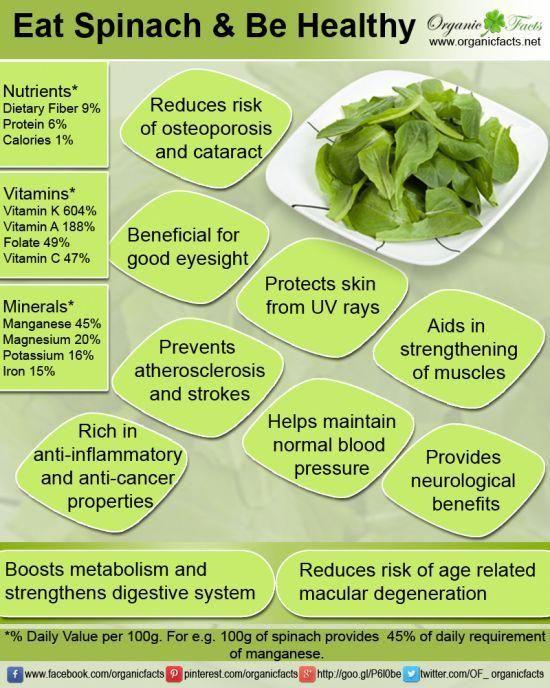Spinach is an abundant leafy green veggie packed with essential vitamins and minerals. It has numerous health benefits, such as lowering blood sugar for diabetics and strengthening bones.
This superfruit is also packed with antioxidants like Vitamin C, alpha-lipoic acid, lutein, zeaxanthin and neoxanthin. Studies have demonstrated that these nutrients can protect against cancer as well as slow down cognitive decline in older adults.
High in Vitamin A
Spinach is packed with vitamin A, essential for the growth and health of all cells throughout your body. Notably, it also plays an essential role in skin health by keeping it radiant and smooth.

This nutrient helps control oil production in pores and hair follicles, helping to prevent acne, dark circles, and other blemishes. Furthermore, it encourages collagen production for strong bones and healthy skin.
Additionally, vitamin A helps keep mucus membranes healthy that protect your eyes from cataracts and age-related macular degeneration.
Eating spinach daily has been linked to a lower risk of inflammation, which may be the underlying cause of many chronic illnesses. It may even help alleviate symptoms associated with inflammatory conditions like heart disease and arthritis.
High in Vitamin C
Spinach is an excellent source of vitamin C, with 100 grams of boiled and drained spinach providing you with up to 90 percent of your daily recommended intake. Furthermore, it boasts several other beneficial nutrients like vitamin A, K1 and folic acid.

Studies have demonstrated that green tea may reduce oxidative stress and help protect against free radical damage, which can speed up aging and raise your risk for cancer and diabetes. Furthermore, it contains lutein and zeaxanthin – two antioxidants known to improve eye health.
This leafy vegetable helps regulate your blood pressure with its high potassium content. Furthermore, it contains nitrates which may promote heart health by decreasing arterial stiffness and improving circulation.
High in Iron
Spinach is an excellent source of iron, providing about 25% of your daily recommended intake. This micronutrient helps the body produce red blood cells – essential for transporting oxygen throughout the body – that aid in oxygen absorption.

This nutrient also improves bone health by helping to prevent osteoporosis and keeps arteries from hardening with age. Furthermore, lutein found in this supplement reduces the risk of developing heart disease.
Spinach is an excellent source of iron as well as vitamin C, riboflavin, niacin, potassium and magnesium. Furthermore, it contains antioxidants like lutein, zeaxanthin, alpha-lipoic acid and neoxanthin that help shield your body from free radical damage.
It also contains high concentrations of vitamins K, folic acid, lutein and b-carotene that help combat oxidative stress while improving motor and cognitive skills. Furthermore, nitric oxide may lower blood pressure by keeping arteries flexible.
High in Calcium
Spinach is an excellent source of calcium and magnesium, essential nutrients for bone health. Plus, it contains vitamin K1 which helps combat osteoporosis–a condition in which bones become weak and fragile–which can be fatal if left untreated.
Spinach contains antioxidants such as lutein, beta carotene and coumaric acid. These phytochemicals help prevent chronic diseases and DNA oxidation.
Eating spinach regularly will benefit your heart by increasing blood flow and lowering blood pressure. Furthermore, it strengthens the immune system, shielding you from infections and illnesses.
High in Magnesium
Spinach is high in magnesium, which supports a healthy heart and immune system. Furthermore, it contains plenty of antioxidants that fight inflammation and may even prevent cancer.
This leafy green provides an impressive amount of folate, essential for red blood cell formation and DNA replication. Plus, it’s packed full of potassium, calcium, and iron – making it a nutritious addition to your diet!
Other high-nutrient sources of magnesium include whole grains, nuts, seeds, legumes and fish – especially mackerel which provides 20% of your daily value in just 1 cup serving!








